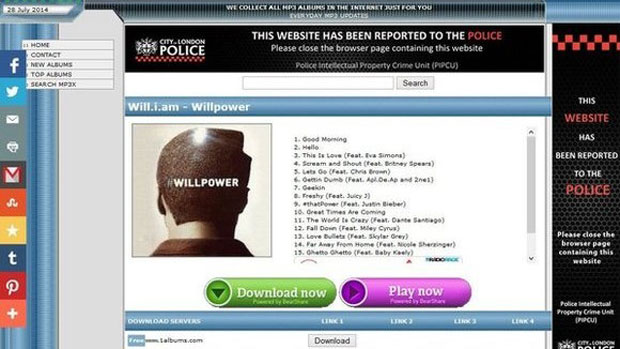Police 'hijack' adverts on piracy websites
Police adverts 'won't deter committed pirates', but could hit pirates where it hurts

A free daily email with the biggest news stories of the day – and the best features from TheWeek.com
You are now subscribed
Your newsletter sign-up was successful
Advertising on some illegal websites has been replaced with a message from the police warning users that the site is under criminal investigation for copyright infringement.
The banners replace paid advertising and instructs users to leave the website.
This is the latest part of Operation Creative, a initiative set up by the Police Intellectual Property Crime Unit (Pipcu) and the creative industries to target online piracy, the BBC reports.
The Week
Escape your echo chamber. Get the facts behind the news, plus analysis from multiple perspectives.

Sign up for The Week's Free Newsletters
From our morning news briefing to a weekly Good News Newsletter, get the best of The Week delivered directly to your inbox.
From our morning news briefing to a weekly Good News Newsletter, get the best of The Week delivered directly to your inbox.
The adverts are placed onto the sites using technology provided by Project SunBlock, a company that stops legitimate adverts from "appearing alongside questionable content such as pirated material or pornography".
These adverts will work to inform people who are unaware that the site is illegal, but will not deter "committed pirates" Adam Rendle, a senior associate at law firm Taylor Wessing, told PC Pro.
The announcement sparked criticism from social media users who mocked the police's 'hard-line' approach to tackling piracy.
London Police get SERIOUSLY tough on torrent piracy!.. (By asking you to close your browser) http://t.co/YcFm9Xn0jf#laughable— Clive Mason (@Trance4Mason) July 29, 2014
However, the main objective of the operation is to target the revenue these sites receive from advertisers, not simply to warn off offenders.
A free daily email with the biggest news stories of the day – and the best features from TheWeek.com
Piracy sites make a large proportion of their money from advertising, so disrupting this revenue stream performs a "crucial" role in minimising "criminal profits", said Pipcu's Det Ch Insp Andy Fyfe.
The BBC's Dave Lee describes the approach to disrupt their finances as "a more painful way" of affecting the owners of these illegal sites.
Some social media users have questioned why the police would be involved in tackling piracy, which is widely considered to be a civil offence. But piracy committed on a commercial scale is a criminal offence and can be prosecuted under the Copyright, Designs and Patents Act 1988.
Am I wrong to think that most of this piracy (if not fraud) is civil not criminal? Why are police involved? http://t.co/1NwhW29j7y — Tim Turner (@tim2040) July 29, 2014
Others suggested that media companies may have more success in tackling piracy if they made the legal alternatives more appealing.
Police adverts to appear on piracy sites. Will do nothing. What is needed is a complete review into media pricing and the cinema industry.. — Phil (@DelBoyd10) July 29, 2014
-
 The Olympic timekeepers keeping the Games on track
The Olympic timekeepers keeping the Games on trackUnder the Radar Swiss watchmaking giant Omega has been at the finish line of every Olympic Games for nearly 100 years
-
 Will increasing tensions with Iran boil over into war?
Will increasing tensions with Iran boil over into war?Today’s Big Question President Donald Trump has recently been threatening the country
-
 Corruption: The spy sheikh and the president
Corruption: The spy sheikh and the presidentFeature Trump is at the center of another scandal